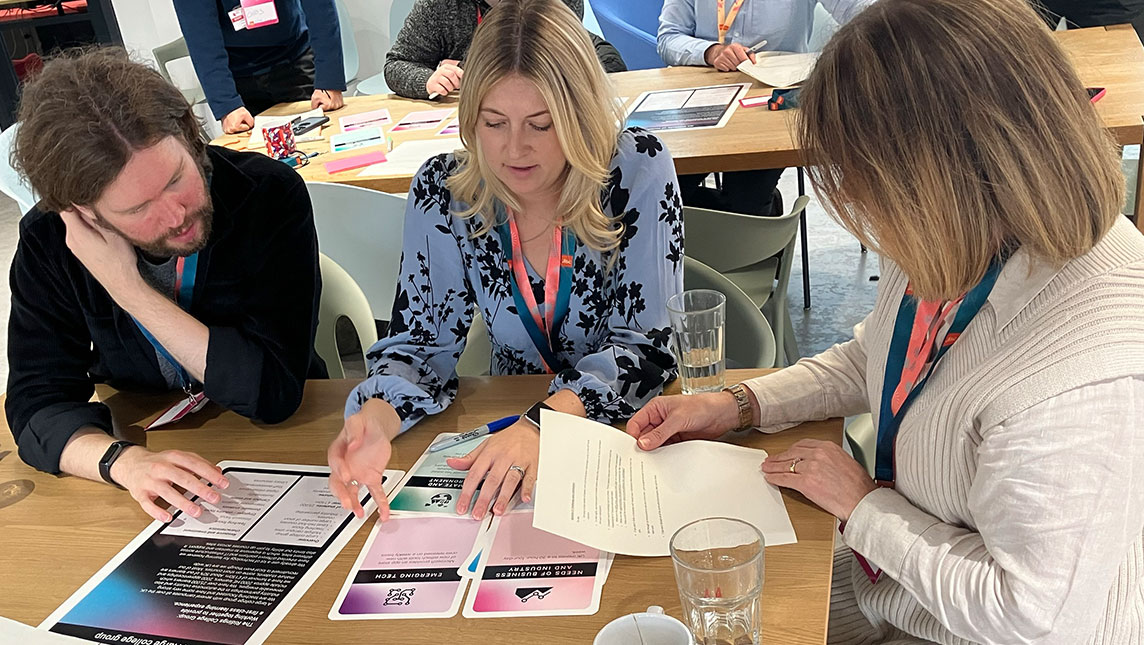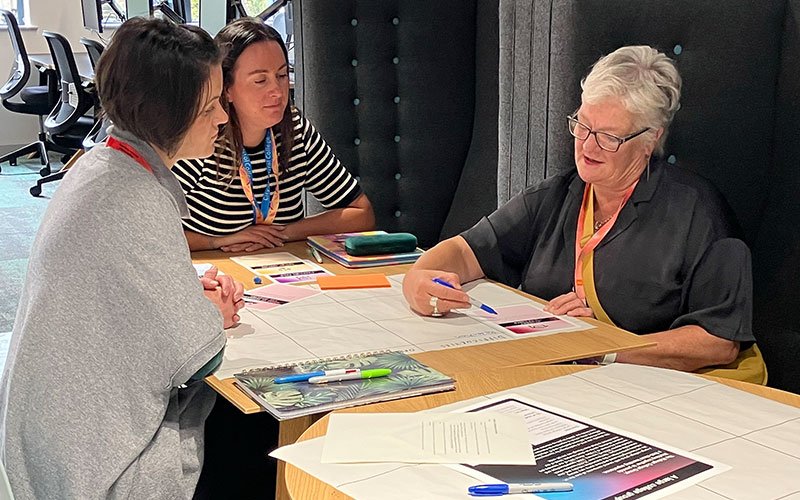Imagine the future of further education with Jisc
To mark the Association of Colleges (AoC) Colleges Week 2023, Jisc invited digital education leaders from further education (FE) providers to imagine the future of education by taking part in a pilot interactive workshop.

Since the pandemic, the FE sector has had to swiftly embrace the use of digital technologies across teaching, learning and assessment, with some truly transformational results. For many, the future is already here, and it is the responsibility of organisations like Jisc to support members to keep up with the rapid pace of digital trends.
Imagination at work
Developed in collaboration by edtech, co-design and innovation teams at Jisc, the imagined futures workshop allows attendees to remove themselves from the here and now, and envisage the FE landscape of 10, 20 or 30 years.
Groups were asked to choose a fictional case study for an institution operating in the FE sector, for example, a large college group, a small rural college, an institute of technology and a private business leading their own apprenticeship programmes.
Then, using a selection of challenge and solution cards based on potential future scenarios, the teams tackled the challenges, opportunities and reactions needed to achieve the ambitions of their chosen organisation.
The event also included demonstrations from Jisc innovation experts and Jisc’s national centre for AI in tertiary education, who showcased how to get the best out of digital tools already being used, such as AI platform Teachermatic, and emerging technologies such as holograms and 3D displays.
Throughout the day, attendees were able to unlock a way of thinking not usually afforded to them due to the time and cost pressures impacting the sector. By proactively asking ‘where do you want to go?’ Jisc will be better placed to help members get there.

The future at your college
The feedback from the event was overwhelmingly positive, with attendees saying they were able to view the future of their own organisations through fresh eyes.
When asked how he envisioned the future of his college, Scott Morgan, head of digital innovation & IT services at Bridgend College, said:
“Personalised learning, supported by artificial intelligence (AI), is one of our goals and we want to move to a place where learners know exactly why they're doing their course, the progression opportunities it provides and how they can get there.
“There is currently a lot of noise around AI; not just in the sector but in society too and literally thousands of new tools have popped up in the last 12 months.
“All of them claim to save time, help productivity, and make your life easier, but colleges simply don't have the resource to sort through these and separate the good stuff from the rest.
“Jisc can support us in this endeavor by identifying what works and what doesn’t. Case studies, meetups and workshops like this one are all useful.”
Louise Pratten, head of digital education at Weston College, said:
“FE is such an exciting sector: it’s so responsive to change and ready to embrace new opportunities.
“We need to continue developing our approaches in line with the needs of industry and with emerging pedagogies which address the skills agenda and utilise technology and digital advances.
“At Weston, we want to explore these changes and use them to inform our strategy for the future, building flexible offerings for education suited to the needs of our learners in the 21st Century.
“These offerings will make use of technologies such as hybrid spaces and immersive content to enhance and extend learning experiences, contextualising content and helping to bring it to life.”
Consider the challenges
When imagining the future it’s important to examine the challenges as well as the opportunities to help you get to where you want to go.
Karen Foster, head of resource innovation at Yeovil College said:
“The biggest challenge facing our college, and historically the FE sector as a whole, is funding.
“At Yeovil we make a concerted effort to tap into the funds available to us, and we always consider technology as a potential investment to improve the teaching and learning experience.
“However, it’s no longer just the cost of the product that is a factor, we also have to consider the sustainability and longevity of the purchases we make and imagine how each product can be used in three or five years' time.
“This is especially important when considering things like immersive technologies as we know what we are using now is only a precursor to what will be used in industry in the future.
“We’re much savvier when purchasing these days because we consider not only the cost but the ethical use of each product.”
Scott Morgan continued:
“I believe the biggest challenge facing FE, and education as a whole, is that not everyone can access digital technology or connectivity on demand.
“If we do not truly address equity of access globally, we risk creating a two-tiered society. Those with access to powerful AI generation tools will advance at a much quicker pace than those who do not, and we risk leaving a significant proportion of our population behind.”

Navigating the future together
The speed of digital transformation is not likely to slow down and coping with rapid change will become an increasing challenge.
Across the UK FE sector colleges and learning providers are at different stages of their digital transformation journey, making a definitive ‘one size fits all’ vision of the future impossible.
But, this also provides a great opportunity for collaboration: collaboration with other colleges that have already overcome some of the challenges being faced, collaboration with industry to ensure the FE sector is delivering the skills needed by the future workforce, and collaboration with organisations such as Jisc that provide support to help learning providers achieve their digital ambitions.
When asked for her thoughts on the day, Stevie Emmanuel, head of technology enhanced learning at Cardiff and Vale College, said:
“The event supported me to direct my thoughts towards the future of FE. It was useful to share ideas and plan execution of these with likeminded leaders.
“One of the ideas that stood out to me was developing a true hybrid learning approach and the potential impact this could have on sustainability, staff workload and learner engagement.
“The workshop allowed us to think outside of the box and push the limits of what we imagine FE to be in the future. It's something I would like to share with leaders within my organisation.”
Paul Bailey, head of co-design at Jisc and facilitator of the imagined futures workshop, said:
“It is essential for us to hear firsthand the challenges facing the FE and skills sector so we can work collaboratively to help colleges achieve their future ambitions.
“There are many drivers for change including an international and UK-wide growth in student numbers, political and social changes, an increasing focus on employability skills and (of particular interest to us at Jisc) the emergence of new technologies such as Generative AI, edge computing, and immersive learning.
“Taking these factors into consideration, we will use the feedback from this pilot workshop, and our experiences from the day, to further develop the resources needed to explore imagined futures across tertiary education and research.
“Outputs from the event will also be used to inform our innovation projects that help develop new solutions and services for our members.”
Stevie Emmanuel concluded:
“The research Jisc is doing into future technologies and developments in the way we learn is an invaluable part of helping colleges like ours develop. Facilitating collaboration with the wider sector stimulates the growth of ideas and helps us to future-proof our provision.”
Join our imagined futures JiscMail list if you would like to receive resources from the workshop.
Register for Digifest 2024 to attend one of the imagined futures workshops taking place at the event to continue the conversation.